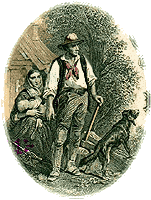





The Intruders were those white folk who illegally settled on Indian lands. The term squatters could also be applied to them. From the time of the first intruder who broke the King’s law, to last treaty of removal, the intruder was a bane to the authorities (and the Indians). At times, the authorities dealt fairly with the intruders, at other times, the authorities were extremely harsh. Those white folk who hunted on Indian lands, who passed through those lands with out possessing the required passport, or who traded with the Indians without possessing the required license, were also considered intruders.
As the frontier moved to the south and west, the intruders were there to take the Indians’ land.
Search Engine
Search This Intruders Site,
Indian Land Cessions in Tennessee,
and The First People of TennesseeThe Royal Proclamation : 1763
The Wataugans/Franklinites
Thomas Jefferson’s Plan for the Indians
An Ordinance for the Regulation of Indian Affairs : 1786 : See full text version
This federal ordinance regulated trade with the Indians and prohibited settlement on Indian lands. Passports were required to cross Indian lands.Congressional Proclamation on Intruders : 1788
An Act to Regulate Trade and Intercourse With the Indian Tribes : 1790 :
See full text version
“Under the terms of the federal Trade and Intercourse Act of 1790 and the U.S. Constitution, treaties involving the transfer of Indian lands required participation and approval of the federal government. The purpose of the law was to protect Indian nations and tribes from fraudulent land transactions perpetrated by land speculators and state governments. Land taken from Indian nations in violation of this law remains the property of the Indian nation.”
______
Quote : Indian Law Resource CenterGeorge Washington letter to Henry Knox : 1790
Here, President George Washington simply questions Secretary of War, Henry Knox about the recently passed Trade and Intercourse Act.Treaty of Holston, 1791 : See full text version
ARTICLE VIII. “If any citizen of the United States, or other person not being an Indian, shall settle on any of the Cherokeesí lands, such person shall forfeit the protection of the United States, and the Cherokees may punish him or not, as they please.”George Washington letter to Edmund Randolph : 1791
“. . . Restraining States or Individuals from purchasing their lands, and forbidding unauthorized intercourse in their dealing with them.”Thomas Jefferson to David Campbell : 1792
“I am satisfied it will ever be preferred to send an armed force and make war against the intruders as being more just & less expensive.”Thomas Jefferson to William Blount : 1792
“. . . grants of land by the state of N. Carolina since her deed of cession, south of the French Broad river . . . whether it has been by error or under any claim of right on their part?”An Act to Regulate Trade and Intercourse with the Indian Tribes, and to Preserve Peace on the Frontiers : 1796 : See full text version
This greatly modified version of the 1790 Act contained both a boundary description between the white settlers and the Indians, and methods to enforce that boundary. This had a great effect on the settlers of northern East Tennessee. The treaty line in question was established in 1791 and set forth in the Treaty of Holston, but it was not run for several years. When it was finished, it found settlers over the treaty line. They were then intruders.Governor John Sevier, Second Inaugural Address : 1797
“. . . this bright prospect of affairs is considerably darkened by the extension of the Indian Boundary line . . .”Governor John Sevier to the Tennessee Legislature : 1797
Impending removal of Tennessee settlers by federal troops.Insolvents Living Within the Indian Boundary for the Year 1797 : Grainger County
Governor John Sevier to the Tennessee Legislature : 1798
The arrest of Tennessee citizens for hunting on “land falsely claimed by the Cherokees.”How the Cherokee Lost Elk River : 1807
A federal treaty error caused settlers of the upper Elk River to become Intruders, but it was all fixed with a ’Silent Consideration.”Doublehead’s Reserve : 1806-1817
An Act to Prevent Settlements being made on Lands Ceded to the United States : 1807 :
See full text version
Petition of Bledsoe County Residents who Settled South of the Indian Boundary : 1809 : See the List of “Intruders” on our Bledsoe County Site.
Thomas Jefferson’s Memoranda to President Madison : 1809
Giles County Tennessee, Madison County Mississippi Territory Intruders : 1809-1811
Settlers on Indian Lands Driven OffElk River Intruders : 1809
Elk River Intruders’ Petition : 1810
Thieves and Intruders : 1814
Giles Co. Tennessee, Madison Co. M.T. and Surrounds : 1805-1817 : a Map
Fort Hampton and Surrounds, Alabama Territory : 1817 : a Map
Memorial to the Secretary at War : 1819
“Memorial of the inhabitants residents in the Cherokee Country relative to the late order for their removal.”An 1820 Claim to Congress ~ Re: Alabama ~ 1817.
Cattle Illegally Seized and Sold
Adverse to the Indian Grant to the Double Head Company ~ 1828.
A Report on a Memorial to Congress

